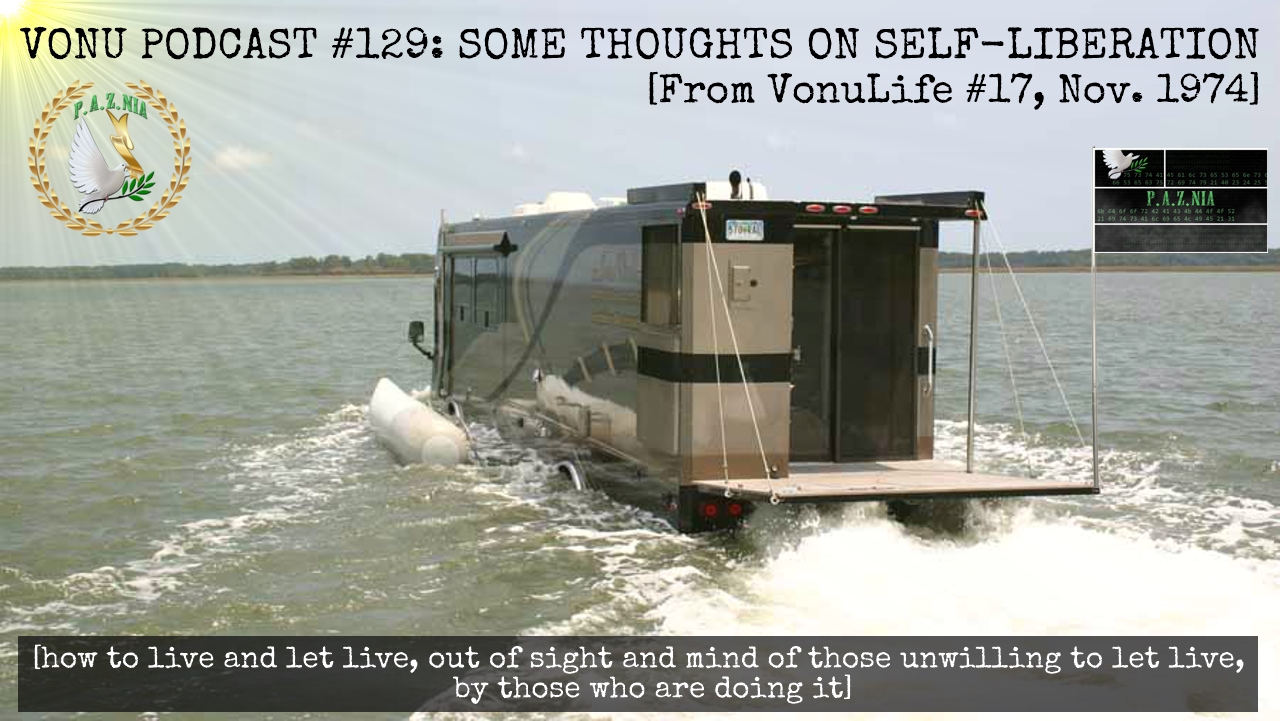Podcast: Play in new window | Download
Subscribe: Apple Podcasts | Android | Email | Google Podcasts | Stitcher | TuneIn | Spotify | RSS
[Editor’s Note: The following is another submission found in VonuLife that I thought to be of value and worth passing along. I made a few minor formatting alterations for readability, but otherwise, it remains intact as it was. In 2022, hopefully the entire collection of VonuLife, 1-17, will be out for free digitally and in paperback format from Liberty Under Attack Publications. Until then, please enjoy, and always remember, vonu is yours for the making.]

SOME THOUGHTS ON VONU (From VonuLife #17, Nov. 1974)
By: MASTER SATAN aka THOR XAVIER CHALLENGER
Someone wrote once that Vonuans can never be self-sufficient in all things, and I tend to agree. The idea was that even without self-sufficiency, many things a vonuan needs can be either manufactured outside the System or purchased within the system and maintained outside the System. Also components for self-manufactured systems could be obtained inside the System and then reconfigured outside it to serve our needs. This is the area I’ve been working. In planning my own conversion to a vonu lifestyle, I have had to consider transportation, communications, data storage, comfort, defense, and a multitude of other areas which I was unwilling to give up in order to be vonu. Although I am not yet living that vonu lifestyle, I am convinced that I now know how to do so and what it will cost me. My present activities are devoted to earning the money to accomplish my aims.
Let’s take transportation first: My answer to the transportation problem lies not in the conventional van camper. Such a vehicle is too easily subject to counter-vonu (cv) forces, has too cramped a living space (at least, one I can afford is), and is more or less subject to the restrictions of on-road travel. I considered that the only way to really escape such restrictions is an off-road vehicle. Conventional four-wheel drive vehicles are very expensive, however, and even more cramped for space. This made it clear that the vehicle that was needed had to be a “home-made’ or “custom” job. While this indicated higher initial cost, I estimated that it could still be built for less than a conventional vehicle, based on data available pertaining to dune buggies. So the first requirement was a four-wheel-drive chassis and a reasonably powerful, but economical engine. But such a vehicle is still limited; it cannot cross rivers, and it could be chased by similar vehicles.
Therefore, I decided that an amphibious vehicle would be in order: no police vehicle could chase it, no terrain could stop it short of heavy waves, storms, etc., in which case one would not wish to travel anyway. There was a precedent for such vehicles, of course; many military models existed, including a Volkswagen amphibian during WWII. And I had read where conventional Volkswagens could be cheaply modified to act as amphibians. Coupling this with the well-known dune buggy produced an inexpensive, amphibious, all-terrain vehicle. But I didn’t stop there: other features were considered. Conventional amphibians are very slow: the addition of a fairly powerful outboard motor (or perhaps a propeller hooked to a drive train takeoff) might up the speed and carrying capacity on water. The use of the hydrofoil was suggested by experiments involving military amphibians; this would increase water speed. Numerous experimental vehicles are described in the Popular Science, Popular Mechanics-type magazines every month. Features from these vehicles were considered. The recent discovery of Dr. Wankel of engine fame that a torpedo-shaped personal boat with hydrofoils could be used to travel at speeds up to 60 miles per hour through waves 10 times its length in height indicated that much could be done with the standard amphibian. Dual, large, on-off-road tires; hydrofoils; lightweight, tough fiberglass body; Lexan cockpit; motorized raisable outboard engines; all these would increase the vehicles’ capacity to travel any ground.
But the problem of shelter remained. But this was simply answered: do not try to make your vehicle your home! This was the flaw of the conventional van; shelter required considerable living space as well as storage space, greatly increasing the size of the vehicle, its weight, and lowering its maneuverability. The answer was to use various shelters already being used by vonuans: plastic tents, temporary shelters of naturel materials, domes, etc. But how to carry supplies and shelter? The answer had to be a trailer. But the conventional trailer is as inefficient as the conventional car. Therefore I devised a trailer which was made of lightweight fiberglass, which opened up into a maze of poles and tie-downs and plastic tents covering many square feet. This trailer was towed on strap-on boat wheels (commercially available), could be equipped with its own hydrofoils, and still carry some cargo. The trailer was attached to the vehicle by an articulated hitch which would raise its towing over rough ground. It would be packed like a fine watch, permitting maximum utilization of storage space.
SO: one would have a vehicle capable of eluding the law, capable of street operation (based as it is on conventional chassis and engines), capable of off-road travel to a degree unknown to all but specifically designed all-terrain vehicles), capable of carrying all the necessary implements of survival and comfort, plus able to tow the equivalent shelter of a house with it. With the use of inflatable plastic structures, one could increase this shelter space substantially.
Such a vehicle could ease the vehicular MTH (mean time to harassment) from 1-2 years to 5-10 years, as the vehicle could go places no other could – especially bludg cars. Thus greater comfort, storage, and technology would be permitted in more remote areas, enabling more vonu and better vonu. Any such vehicle is of course still subject to the bludg (so are bikes in some areas, and even pedestrians); however, an ATV could be operated primarily off-road, thus obviating licenses and such; such a vehicle could still be driven on roads in remote areas with phoney license plates, etc., or at night, with the driver confident that if spotted by police, he could immediately take to rough ground or water without fear of pursuit. I regard the design and construction of such a vehicle of great importance to the improvement of vonu; hopefully I will be able to build a prototype within a year or two, if I can acquire the funds. Such a vehicle could be built for amounts between $3-6000, depending on the amount of home labor, the cost of new or used materials, the cost of the used chassis and engines, the amount of hired labor, the degree of all-terrain and/or amphibious capability. This is somewhat higher than the usual van camper, but consider the increased capability and benefits, Furthermore, the widespread use of such vehicles could reduce the need for highways, and other destructive and expensive systems designed for the automobile. Such vehicles could be designed to be ecologically sound, by the use of new energy sources, and by the use of low-pressure tires which cause less soil damage then horses or human feet, and of course by care in driving.
And one vehicle can serve as boat and car enabling economies of hauling, etc. All in all, a brilliant idea – if it works – and I’m glad I thought of it!
COMMUNICATION: How about laser transceivers? Plans for homemade jobs exist that can be built for $100 or so, with a range of up to eight miles; and improvements could be made easily. The only fault is bad weather intercepts the beams; but there could be ways around that. This would be as cheap as ham radios easily; a system could be designed around laser transceivers, cheap CB sets, etc. and the system could be used to make money during the coming Depression, servicing areas which lose service from the monopolies.
FOOD: Why hasn’t anyone mentioned fish in the context of land vonu? Locate yourself a large stream in the northern California area, use fish traps, set-lines, fish poisons, slingshots, etc. to catch large amounts of fish easily and quickly. Many books are filled with info on this; fish protein is excellent, although the calorie content leaves something to be desired. Herter’s has a book called “How to Get Out of the Rat Race and Live on $10 a Month” and has a good deal of Info on this.
HEAT: The plans for solar devices seem to be coming out of the woodwork now, since the energy crisis. It is now clear that for a few dollars one can cook one’s food, heat one’s water for showering, perform various handicrafts requiring heat up to 2000%, heat one’s shelter and do many more things. Soon one will be able to derive electricity efficiently, and at that point vonu will really become easy. Of course, as long as these devices require direct sunlight, and as long as there are cloudy days, one must have backup systems, but efficient use of simple solar devices can cut one’s costs in such areas as fuel primarily.
WEAPONS: Some comments have been made about slingshots, blowguns, etc. I am presently acquiring a number of martial arts weapons, a slingshot, some large steel balls from Herter’s which they claim will kill a deer and go right through small game, when fired from a slingshot, & blowgun which is claimed to have as much penetrating power as a .22. I plan on acquiring an air rifle which is claimed to have killing power approximately equal to a .22 for up to, I guess, 50 yards, and which requires a few simple lever-action pumps to bring it up to power, plus various other devices, including silencers for the air weapons, since I believe even an air rifle is rather loud. I recently read a book on silencers, and those jobbies you see on TV are worthless; you need probably one at least a foot long to do a good job, and none will help if your bullet is supersonic.
But some very good models have been made, some quieting flash and sound down to the point where the weapon really does make no more noise than a hiss and the clack of the action. A number of weapons have been made especially for assassination, and I think every yonuan should eventually own a pistol or rifle adequate to kill a human at some distance via sniping and equipped with a silencer. Silencers are expensive, starting at $300, but there are a number of books and someone good with tools could probably build one for less than $50. I recently read a book entitled the Poor Man’s James Bond, and believe me, it is very gut level, and completely detailed on making bombs, poison, various weaponry, incendiaries, counterfeiting, use of electronic devices to activate explosives, terrorist tricks, etc. Every vonuan should have one; it’s available from Hillcrest Publications.
VONULIFE, MARCH 1973: SPECIAL COLLECTOR’S EDITION
[VonuLife, March 1973 is available in paperback format via Liberty Under Attack Publications! Or get it in The Vonu Bundle!]
COMMERCE: Vonu commerce won’t come about until there is not only enough vonuans to make it possible, but enough communications and especially enough need. And since the purpose of vonuism is to reduce external needs, we have one strike against us starting out. I would suggest we not worry too greatly about vonu in groups, etc. and concentrate more on maximizing the extent of individual vonu. I firmly believe that a high-technology vonu lifestyle is possible at reasonable cost, and considerable independence from outside maintenance, but the requirements include considerable knowledge of what’s possible today, and a willingness to utilize more money than most vonuans seem to be able to earn = say, $5,000 to start out with instead of $1,000. This brings up the problem of whether to make money first and then vonu or to vonu and then try to make money. I believe it is not either-or. I believe the most practical solution is to make a certain level of money first in any profession, then achieve vonu with an excellent MTH, and then develop an entirely new source of income based on vonu conditions.
The usual idea is to profit and then try to vonu the profit source, and this is where the difficulty lies; particularly when one does something one likes on the outside, and is then reluctant to drop it in order to go vonu. I am earning money in various ways, and plan to change shortly to entirely new and more interesting ways; but when I go vonu, I may have to completely alter my means or even stop earning money altogether except for odd jobs occasionally. However, my ultimate goal is to return to society with the skills and ideas to enable vonu even in the heart of the society – remembering that vonu merely means relative invulnerability to coercion and does not specify how or where. It has been said that someone who utilizes deterrence without mobility is just another rival State; this does not logically follow. However, it is impractical from the point of view of the individual, since it would be difficult if not impossible for one person or a small group to develop the deterrence to withstand an entire society – without mobility, and/or concealment. Note that “and/or” – too often the choice is artificially narrowed down to either-or; “either” concealment “or” deterrence “or” mobility. This I think stems from the basic inability of many vonuans to think in terms of personal effectiveness, which is the main problem of the entire libertarian movement – and perhaps all movements. I am convinced that there is no reason why someone could not be concealed at some times, not concealed at others, using deterrence at times and not at others, moving to escape at times and not at others, or using all three (a disguised vonuan with phoney ID, moving along a deserted highway, is stopped by a bludg, eliminates the bludg with a silenced weapon, and disappears into the hills.)
The question is one of powers and how they may be used; if you have mobility, then you need concealment and deterrence; if you have concealment, then you need mobility and deterrence; if you have deterrence, then you need concealment and mobility. If you have one, you need three; if you have two, you need one; if you have all three, you need more of everything! The real mistake is to think: “Well, now I’m hiding out in these hills, I’m vonu.” That is not the case, particularly if you aren’t hiding out in those hills permanently, which is the usual case with most vonuans; they do come close to other humans (or dangerous animals) occasionally, and each occasion is a threat to their vonu. Since my entrance into the pages of the Libertarian Connection, I have stressed personal development as the only means to achieve freedom, and this is as true for the vonuan as it is for the conventional man. And personal development is not limited to meditation or a new way of thinking; it means taking advantage of everything needed to survive, and this can cover the entire field of human endeavor under certain circumstances. Anyone who overlooks various possibilities will shortly find himself in difficulty; this takes into account everything up to and including old age – which is a prime threat and should be high on everyone’s list of priorities.
This brings up the question of “psychological liberation,” since the vast majority of the libertarians in this world do not possess it – including myself to an uncomfortably high degree – and unfortunately including many vonuans. Rayo asked what attitudes toward the State are most conducive to effective action, I suspect the only answer is a combination of drama – the emotional effect of fictional and non-fictional accounts of successful self-liberation – and the acquisition of the actual knowledge needed to accomplish these ends. In other words, I think if one reads books such as Harry Brown’s, the success stories of various vonuans, and other types of self-liberationists, and then proceeds to gather up all the data needed to duplicate these successes, and mixes this all up with meditation, music, and the generation of positive attitudes by whatever means, then this eventually, slowly, painfully perhaps, results in some significant change. Sometimes the change is abrupt and explosive; usually it is slow. In my case, I have spent years making one wrong decision after another; lately I feel that I have made enough progress to the point where I think I can see exactly how to achieve vonu and where I believe that with the acquisition of a specific amount of money and equipment I can do it. This has lead me to try to extend the requirements and thus the time required within the System, but I know that this is itself an indication of the strength I have been given by just knowing that if I have to I can split, say, now, or a week from now. So I have the strength to hang on another month or a year, knowing that it might make things better when I do split. The attitude is: “There are still a lot of good things available to me here, and I think I’d better stay on as long as I don’t incur any extra risks or hang-ups.” This can easily become a rationalization for non-vonu, however!
Every case is different, depending as it does on one’s personal goals. My goal is a high-techno, very mobile, uninterrupted (by bludg) sort of vonu for the sole purpose of providing me with the solitude needed to master the Martial Arts and the Hermetic Sciences and the technological sciences. From this point of personal strength, I would then dart in and out of the System, creating havoc and reaping personal profits of a material and psychic nature, while still maintaining a high level of vonu – thru the acquisition of power, if you will.
My “movementist” phase was extremely short, probably because I had been involved in other movements, such as the UFO movement, and thus had firsthand experience of their ineffectiveness. On the other hand, I am somewhat predisposed to movements by “nature”, so someone without that attitude might very well eliminate the movement phase altogether. I think it would depend significantly on whether his personal environment included movementists or vonuans, or both.
As anyone is aware who has been reading the Libertarian Connection, there is a disturbing trend in that publication to advocate so-called “amoral” coercive philosophies and anti-vonuan sentiments (usually based on the “I don’t want to eat weeds” philosophy). On the other hand, it is slowly seeping out that virtually all the writers for LC have some sort of vonuan fantasy about sea-mobility, or groups of libertarians occupying the Pacific Ocean, and whatnot. Therefore, it would seem that what is happening is that, as the System slowly crumbles, and as each libertarian’s personal situation does not seem to greatly improve, he begins to fantasize about escape from the System on the one hand, but rationalizes his failures on the other by denouncing the feasibility of vonu. I believe that all that is needed is for these individuals to take their fantasies, as Harry Brown said, and “start from zero”: use these fantasies as the basic goal (if only short-term, even), and then devote their energies into actively trying to find out how to achieve these goals. This entails active research into what is physically possible in many areas: science, economics, personal finance, vonu techniques, criminal techniques, market research, etc. It costs money, but it produces psychological results like few other techniques I’ve used. And psychological liberation produces ideas which lead to more possibilities, and starts a reverse spiral upward to actual liberation instead of downward into depression and failure. It is slow and detailed work, but it does work.
Well, I’ll just leave the rest of this page for comments by VL’s editor, if he would like to use it. Anyone wishing to comment can write me, Richard S. Hack, at P.O. Box 14518, Albuquerque, New Mexico 87111.
[DOWNLOAD FOR FREE!]





